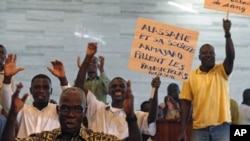West Africa's regional stock exchange has suspended operations in Ivory Coast because of the country's political crisis. It is the latest in a series of financial closures that deepen the economic impact of the standoff between rival presidents.
The regional bourse [stock exchange] is suspending all operations until further notice at its Abidjan headquarters.
In a written statement, exchange president Tiemoko Yade Coulibaly strongly protested actions by the Ministry of Finance that he said violate agreements governing the conduct of the regional bourse.
Soldiers loyal to incumbent Ivorian president Laurent Gbagbo last week raided the stock exchange headquarters, in what Gbagbo finance minister Desire Dallo said was a move to prevent the bourse from relocating.
Sunil Benimadhu, the chief executive of the Mauritius stock exchange and the president of the African Securities Exchanges Association, said, "The closure of any stock exchange is certainly not an event that is welcome by the different stakeholders of the stock exchange, given that people who have invested in a stock exchange want to have the ability to trade in the shares that they have invested in on a daily basis.”
Benimadhu said that in the absence of adequate security, the directors of the West African bourse had no choice.
"It is understandable that in an environment where there is no security, exchanges can do no other thing than close while praying for things to stabilize. We hope that things will stabilize and that business will get back to normal in Ivory Coast and that all the political problems will be resolved so that the stock exchange can start operating normally and that business can start doing what they are supposed to do,” said Benimadhu.
While trading volume had already fallen during this political crisis, the regional bourse was a reminder of the leading role Ivory Coast once played in regional finance, hosting an exchange that listed firms from Benin, Burkina Faso, Guinea Bissau, Mali, Niger, Senegal, and Togo.
Its suspension is the latest financial blow to the Gbagbo government. The regional regulation agency of financial markets in Francophone West Africa moved to Togo after Gbagbo troops occupied its Abidjan offices.
West Africa's central bank cut Gbagbo's access to state funds because he is refusing to yield power to the United-Nations-certified winner of the vote, former prime minister Alassane Ouattara.
The Senegal-based central bank then warned of sanctions against any commercial banks that deal with the Gbagbo government. All branches of Citibank and BNP Paribas closed Monday.
In a statement read on national television, the Gbagbo government said it is taking legal action against those banks for seeking what it calls the “financial asphyxiation” of Ivory Coast.
Regional and international sanctions against the Gbagbo government are meant to deprive it of the cash needed to pay soldiers who remain loyal to the incumbent president.
Banks are limiting withdrawals. Many cash machines are running out of money. There is a shortage of some essential medicines. And the price of cooking gas has more than doubled since November's second-round runoff between Gbagbo and Ouattara.
West Africa Stock Exchange Suspends Ivory Coast Trading




